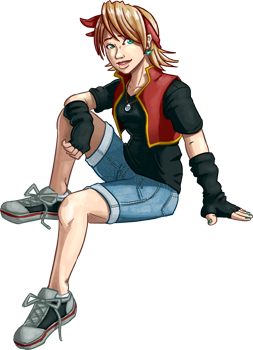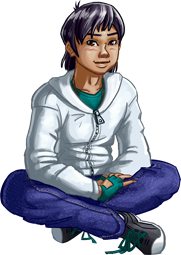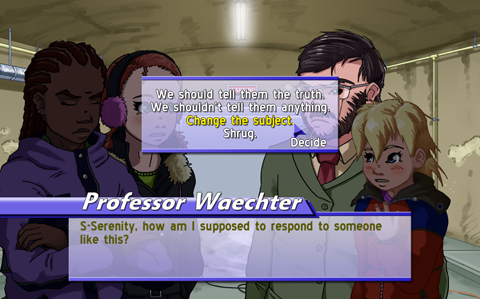Junction is an adventure game at heart, but it takes a lot of inspiration and design cues from visual novels. When playing the game you will often come across prompts like the one pictured above, asking you how you want to respond to a situation. Of course, visual novels aren’t the only medium to use these as a mechanic, and even traditional adventure games like Secret of Monkey Island had them. But I think the way I’ve chosen to incorporate them has more to do with my experience with Japanese visual novels than anything else.
In a traditional visual novel, the choices you make throughout the game determine how the story ends. There are usually a number of endings, often all conflicting, and the story may branch completely differently depending on what choices you made during the course of the narrative. Some endings may be “bad” endings, there may even be multiple “good” endings, and there may or may not be a “canon” ending which is the way the story “really” ends.
You could say that Junction has a canon ending too, but that’s only because it’s the game’s sole ending. There are no “bad” endings to where you fail to achieve the story’s goals, no endings where you get paired up with the character you love the most, no endings designed to squeeze out replay value by making you sit through the game a second time or third time or more to get the “best” ending. I’m not saying that these are bad design decisions, just that Junction doesn’t have them. Those here for the story only have to play the game once to experience and enjoy it.
So you’re probably wondering what I meant when I said that the way choices work in Junction were influenced by visual novels. Well, first and foremost the characters in the game respond to your choices with their own dialog. Because you are Serenity, the heroine of the game, she doesn’t usually say anything without your input (more on this another day), and since you’ll be interacting with others fairly often the way you say or do something is going to elicit a different response from the person you’re talking to, even if the overall conversation is designed “on a rail” and still ultimately ends up in the same place. Virtually every choice in the game will give you new dialog you wouldn’t see otherwise.
Granted, that’s pretty common outside visual novels too, but beyond this there are also a select handful of choices in the game that have long-term consequences. While the game’s overarching story stays the same and never actually branches that much, the characters’ interactions with you and each other may be impacted greatly by what you say and do. These consequences range from simple changes like characters remembering and referencing what you said to them earlier in the game, to more dramatic ones such as two characters getting in an argument and not speaking to each other for long patches of the narrative. Depending on what you do you may get more information than usual when questioning characters later because they’re more willing to open up to you, or you may even trigger unique scenes that wouldn’t otherwise play out at all. Of course, not every choice changes much beyond the immediately following section of dialog, but the game doesn’t tell you up front what is and is not a major decision, so I hope people will approach each decision they make with some degree of thought.
Now one problem with games in general is that they are crude simulations of actual interpersonal interaction. The characters in a game may be compelling, but games like Junction with fluctuating character relationships are still just crunched numbers hidden from sight behind a curtain where results are certain, or at the very least probable, based on what you do or do not do. There’s only so much a game designer can do to avoid this. Savvy players that understand what’s going on behind the curtain are going to make their choices based on what the “right” response is according to the game’s internal logic inside the black box. Modern RPGs are especially prone to this, milking the game for the best outcomes or rewards. For this reason I’m trying very hard to make sure that the changes brought about by the player aren’t necessarily “better” or “worse”, but different. There is meant to be some sort of trade off in the majority of cases. If a response you give at one point cuts off a bunch of scenes you would normally get to see, maybe it adds a unique one of its own later on to make up for it?
A lot of games these days claim to have “meaningful choices”. I can’t claim that my game has anything like this (in part because the term has come to mean so many different things to different people), but I will say that I’m working very hard to make sure that choices have some sort of impact beyond merely existing for the sake of immersion. Junction may not be a masterpiece of storytelling or gameplay, but it’s very much driven by its characters and the world I’ve created for it. By design, everything you need to understand them is meant to be there in your first playthrough, and after that you can put the game down. But if you’d like to delve a little more and learn more about the world, and the characters’ motivations and backstories, I think playing the game a second time will be rewarding for you. Maybe even let the game rest a couple weeks or months and come back to it later like a good book?
Or just dig through the raw text files when you’re done playing. Nobody will begrudge you for that.



